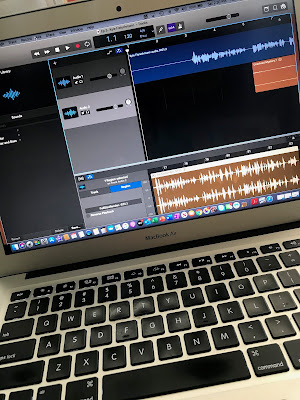Before I decided to create my own podcast, I put in numerous hours listening to others. As I explored the various genres in my podcast app, I paid close attention to the format of each show. S-Town, hosted by Brian Reed of Serial Productions, follows the story of a man named John who hails from “S-Town, Alabama” and claims to know the son of a wealthy local family has been bragging that he got away with committing murder. But as Reed develops a relationship with John over the course of several years, he learns the real heart of this story is a tortured genius who can’t escape his life circumstances no matter how hard he tries. The storytelling of this podcast capitvated me and millions of other listeners around the world, and featured interviews with John, those who knew him, and other members of his small southern community.
Produced by Tenderfoot TV, Radio Rental is part entertainment, part anonymous spine-tingling real-life stories as told by anonymous contributors. The show starts out with commentary by a character named “Terry Carnation,” which actor Rainn Wilson created and acts out for listeners. Each episode is short, 30-45 minutes or less, and features stories like the man convinced he entered a time slip, another listener who booked a massage with his girlfriend in an unfamiliar town at a most suspicious house on the outskirts of town. The listeners tell their stories without any commentary by an interviewer or host.
On “The Sh$T No One Tells You About Writing,” author Bianca Marais interviews, authors, agents, editors, and anyone else involved with bringing books to market. The podcast also features a “Book Hooks” segment, where two literary agents read and critique query letters along with opening pages of books.
As you can see, there are many different ways to structure a podcast and utilize your writing and interviewing skills. For mine, Missing in the Carolinas, I started out by doing research on missing persons cases in North and South Carolina (solved and unsolved) and writing out scripts that I read aloud. I include soft instrumental background music, sound effects, and news clips whenever possible. I’ve had the opportunity to interview other true crime authors and normally do that in-person or via Zoom (see Ep. 13, An Interview with True Crime Writer Cathy Pickens and Ep. 41, Interview with Benjamin Gilmer, author of “The Other Doctor Gilmer.”)
Have you created a podcast? What is it about? I’d love to hear some of your other favorites!
Renee Roberson is an award-winning writer and host/producer of the true crime podcast Missing in the Carolinas. She will be hosting a 90-minute webinar, “You Can Start Your Own Podcast!” on March 22. She will share examples of different formats, what kinds of software, subscriptions, and other tools you may need, finding ideas for creating podcasting content, monetization ideas, and how you can repurpose your materials. Learn more about Renee at her podcast website.



This is a great list, Renee! Besides your amazing podcast, I listen to TSNOTYAW as well, but I only listen to the second half where an author shares craft tips when I see a topic I'm interested in. I'm sure when I start querying a book, I'll be searching through the first half of those to find similar queries.
ReplyDeleteI love your interview podcasts! You're a great interviewer because you let the other person talk. I mostly listen to interview format shows: Otherppl, Write-Minded, CNF, First Draft, Between the Covers, and WTF. I also listen to podcasts from lit journals that do readings, and will search out true crime episodes on topics I'm interested in. I just listened to a few episodes of the documentary style pods "Was I in a Cult?" and "The Satanic Panic" because the hosts are funny. So humor is a big draw for me.
I heard youtubers are moving to podcasts because youtube is so restrictive. That Chapter, the true crime show, started one yesterday for that reason.